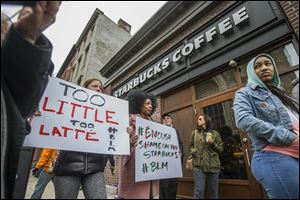
Ordering up a shot of awareness
4/21/2018
Protesters gather outside of a Starbucks in Philadelphia where two black men were arrested after employees called police to say the men were trespassing.
The incident in a Philadelphia Starbucks that has led to nationwide sensitivity training for the entire coffee chain’s workforce is the sort of story that black people have been telling for years. It’s the sort of story too many white people have found unbelievable.
How could that be true? People sit idly in coffee shops all the time, they use the restroom, they hang around waiting for meetings. No one gets arrested for that.
RELATED: TPS must tackle the suspension rate
Yes they do: It is true. It is the reality for too many customers of color of coffee shops and a thousand other businesses. And in the age of viral video, everyone is now confronted with seeing that, unbelievable though it may be, this happens.
Former Starbucks CEO Howard Schultz said the incident, in which two black men were arrested in Philadelphia, for waiting, made him embarrassed and ashamed. The current CEO, Kevin Johnson, met with the two men last week.
Meanwhile the manager who called police to report that the two men refused to either make a purchase or leave no longer works for Starbucks.
Starbucks has announced it will close 8,000 stores on May 29 so that staff can be receive racial-bias education training. The training will focus on helping Starbucks staff to recognize their own unconscious bias so that it does not lead them to treat customers in a discriminatory way.
Critics have dismissed the mass training as a public relations stunt unlikely to prompt any real change. Maybe Starbucks’ motives are mixed, but it’s still a start — a point for reflection and dialogue.
Click here to view more Blade editorials | Check out the Behind The Editorial series
And Starbucks is certainly not alone in its need to address the racial bias of its employees.
What ought to come next is a jobs program. You don’t see a lot of young, black men working at Starbucks, especially in Philadelphia, a city long troubled by racial tensions.
In time we will know whether the company is embarking on a truly new path. In the meantime, other corporate giants would do well to examine their own attitudes, service practices, and hiring policies. Meanwhile, this incident is a wake-up call to a whole lot of Americans who otherwise would not have believed it.